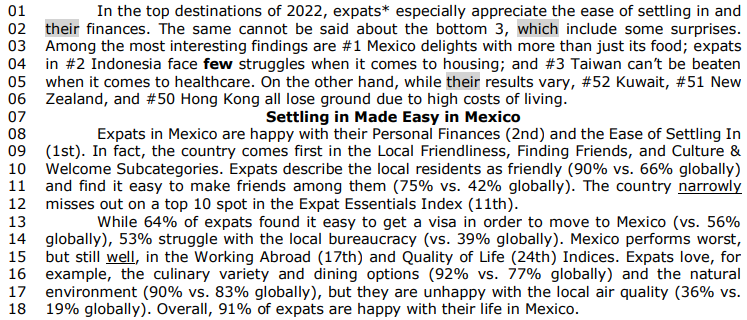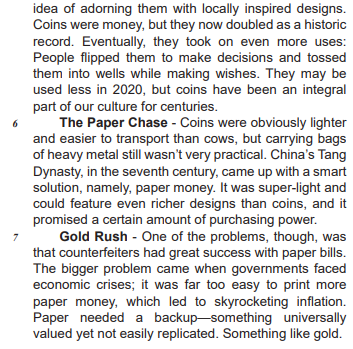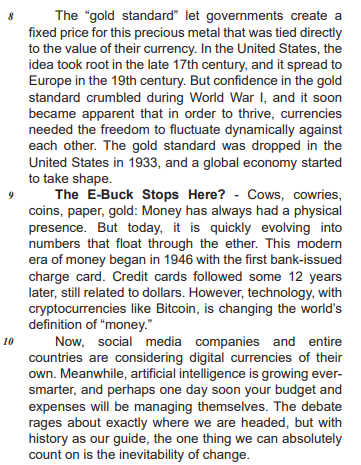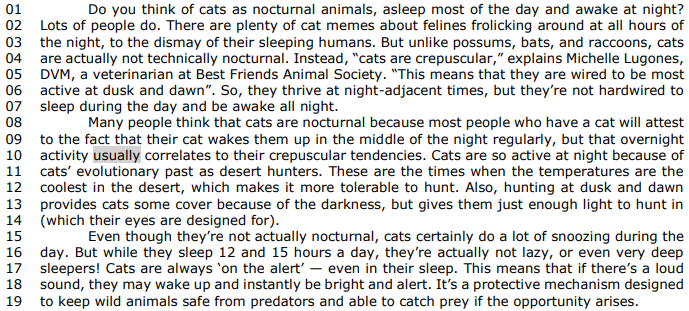Questões de Inglês - Pronomes | Pronouns para Concurso
Foram encontradas 488 questões
“Sarah and Patrick live in a small apartment. _________ dog barks all day long.”

I. The excerpt contains both a comparative and a superlative structure. II. To convey the opposite meaning, it would be grammatically correct to replace the superlative structure with “the less interesting” or “the more boring”. III. The word “its” is a possessive adjective. IV. There would be no significative changes in meaning if the word “among” were replaced by “between” because they are always interchangeable.
Which statements are correct?
(_) Look at those hawks in the sky. (_) These are my books. (_) Is these hotel nice?



Available at: https://www.synchronybank.com/blog/brief-history-of-money/. Retrieved on: Sept 10, 2022. Adapted.
Based on the previous text, judge the following item.
In the second sentence of the last paragraph, “Despite” can
be correctly replaced by Although.

Choose the alternative that correctly fills the gap above.
“One of these is the world’s largest land predator, the polar bear.”
Study the affirmatives below:
1. ‘these’ is a relative pronoun. 2. ‘largest’ is the comparative of superiority form of the adjective ‘ large’. 3. ‘world’s’ means ‘world is’. 4. ‘largest’ is the superlative of superiority form of the adjective ‘ large’. 5. ‘these’ is a demonstrative pronoun.
Choose the alternative which contains all the correct affirmatives.
The words ‘Although’ and ‘though’, in the text mean ‘in spite of something’.
In the text, they are discourse markers that are:
1. The words in bold, in the text, are, pronouns.
2. The underlined word in: ‘Part of reality television’s appeal is due to its ability to place….’, can be replaced by the word ‘because’ without changing its meaning.
3. In the following sentence: “Although the genre has existed in some form or another since the early years of television…” the words in bold, are being used to express a past action.
4. The negative form of the following sentence: ‘Although the genre has existed in some form or another since the early years of television…’, is Although the genre doesn’t have existed in some form or another since the early years of television…’.
Choose the alternative which contains the correct affirmative.
1. The underlined words in the sentence “This long, pointed stick was first used as a weapon…” is an example of active voice in the past tense.
2. The words in bold “they” and “their”, in the text, are being used as a personal pronoun and a possessive adjective, respectively.
3. The negative form of the following sentence: “Do exercises for your arms, legs, back, and neck…” is “Don’t exercise your arms, legs, back, and neck…”.
4. The word ‘properly’ in “it’s important to warm up properly before practicing the javelin.” is an adverb that means correctly or satisfactorily.
Choose the alternative which contains the correct sentences.
Cybersecurity: An overview of cyber challenges facing the nation, and actions needed
Federal agencies and the nation’s critical infrastructure — such as energy, transportation systems, communications, and financial services — depend on Information Technology (IT) systems to carry out operations and process essential data. However, the risks to these IT systems are increasing—including insider threats from witting or unwitting employees, escalating and emerging threats from around the globe, and the emergence of new and more destructive attacks. Rapid developments in new technologies, such as artificial intelligence, the Internet of Things, and ubiquitous Internet and cellular connectivity, can also introduce security issues. Over 28,000 security incidents were reported by federal civilian agencies to the Department of Homeland Security in FY 2019.
Additionally, since many government IT systems contain vast amounts of personally identifiable information (PII), federal agencies must protect the confidentiality, integrity, and availability of this information—and effectively respond to data breaches and security incidents. Likewise, the trend in the private sector of collecting extensive and detailed information about individuals needs appropriate limits.
To highlight the importance of these issues, Government Accountability Office (GAO) has designated information security as a government-wide high-risk area since 1997. This high-risk area was expanded in 2003 to include the protection of critical cyber infrastructure and, in 2015, to include protecting the privacy of PII.
GAO has made about 3,300 recommendations to federal agencies to address cybersecurity shortcomings—and we reported that more than 750 of these had not been fully implemented as of December 2020. We designated 67 as priority, meaning that we believe they warrant priority attention from heads of key departments and agencies.
Adapted from: https://www.gao.gov/cybersecurity. Available on November 16th, 2022
Leia a frase e responda a questão subsequente.
He is quite awake.
Podemos classificar a palavra QUITE como um: